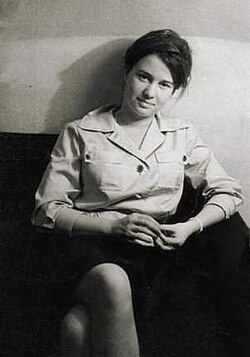Ulrike Marie Meinhof Quote
Protest is when I say I don't like this. Resistance is when I put an end to what I don't like. Protest is when I say I refuse to go along with this anymore. Resistance is when I make sure everybody else stops going along too.
Ulrike Marie Meinhof
Protest is when I say I don't like this. Resistance is when I put an end to what I don't like. Protest is when I say I refuse to go along with this anymore. Resistance is when I make sure everybody else stops going along too.
Related Quotes
Let my silence grow with noise as pregnant mothers grow with life. Let my silence permeate these walls as sunlight permeates a home. Let the silence rise from unwatered graves and craters left by bomb...
Kamand Kojouri
Tags:
abuse, abused, activism, activism poems, activist, amnesty, bellies, bombs, broken hearts, coming together
About Ulrike Marie Meinhof
Ulrike Marie Meinhof (7 October 1934 – 9 May 1976) was a German left-wing militant, journalist and founding member of the Red Army Faction (RAF) in West Germany, commonly referred to in the press as the "Baader-Meinhof gang". She is the reputed author of The Urban Guerilla Concept (1971). The manifesto acknowledges the RAF's "roots in the history of the student movement"; condemns "reformism" as "a brake on the anti-capitalist struggle"; and invokes Mao Zedong to define "armed struggle" as "the highest form of Marxism-Leninism".
Meinhof, who took part in the RAF's "May Offensive" in 1972, was arrested that June and spent the rest of her life in custody, largely isolated from outside contact. In November 1974, she was sentenced to 8 years in prison for complicity in a near-fatal shooting in what had been her first RAF operation, the successful jailbreak of Andreas Baader in 1970.
From 1975, with Baader and two other RAF leaders, Gudrun Ensslin and Jan-Carl Raspe, she stood trial on further charges of murder and attempted murder. Before the end of the trial, she was found hanged in her cell in the Stammheim Prison. The official finding of suicide sparked controversy, with her sister, Wienke Zitzlaff, stating that Meinhof had told her only days before her death: "You can stand up and fight only while you are alive. If they say I committed suicide, be sure that it was a murder.": 582
One year later, on 7 April 1977, two members of the RAF assassinated the Federal Attorney-General Siegfried Buback as revenge.
Meinhof, who took part in the RAF's "May Offensive" in 1972, was arrested that June and spent the rest of her life in custody, largely isolated from outside contact. In November 1974, she was sentenced to 8 years in prison for complicity in a near-fatal shooting in what had been her first RAF operation, the successful jailbreak of Andreas Baader in 1970.
From 1975, with Baader and two other RAF leaders, Gudrun Ensslin and Jan-Carl Raspe, she stood trial on further charges of murder and attempted murder. Before the end of the trial, she was found hanged in her cell in the Stammheim Prison. The official finding of suicide sparked controversy, with her sister, Wienke Zitzlaff, stating that Meinhof had told her only days before her death: "You can stand up and fight only while you are alive. If they say I committed suicide, be sure that it was a murder.": 582
One year later, on 7 April 1977, two members of the RAF assassinated the Federal Attorney-General Siegfried Buback as revenge.
